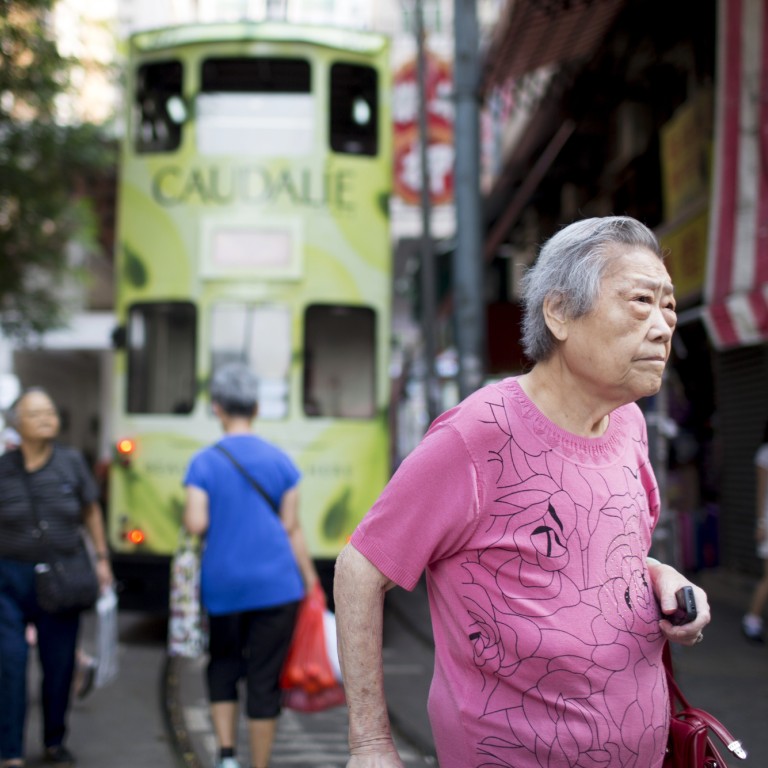
Benefits of building a barrier-free city will outweigh the costs
Mabel Chan says Hong Kong cannot afford to wait any longer as our population profile ages rapidly
It is not news that the price for space in Hong Kong is among the highest in the world's most developed cities; as the Chinese analogy describes: "every inch of space is gold". Certainly, all Hong Kong residents are very aware of the economic pressures this high cost per square foot brings, and the impact on their lifestyle. But one critical longer-term impact has largely escaped our notice: our collective loss of freedom.
Hong Kong is known for its convenience, including the proximity of goods and services and a highly efficient public transport system. But this convenience applies only to a proportion of the population, that is, those of us who are strong and agile.
For others, such as the elderly or those in wheelchairs, an otherwise simple journey is difficult - if possible at all - often requiring significant detours through back doors or service areas, or filled with obstacles such as a door that is simply too heavy to open.
Enhanced barrier-free access, or universal accessibility, is the art of creating environments that maximise usability with flexibility for people with different abilities and ages without discrimination. In Hong Kong, this is merely an idea on paper, with some lip service thrown in, perhaps, but still an idea lacking in care, technical knowledge and execution.
Some Hong Kong people may have wrongly assumed that we've already taken steps towards inclusion, given that the international symbol of accessibility - a wheelchair - is frequently seen. It needs to be understood, however, that the existence of signage alone does not make a space accessible in reality.
In fact, full universal access does not require any signage that segregates or stigmatises any party; everything is simply functional for all.
To make universal accessibility work for all, space is required. This should not be viewed as additional space, but rather a prerequisite for sustainable development in a city that by law, supposedly guarantees equal opportunities, and secondly, will serve the growing number of elderly among us.
At present, the construction industry is purely driven by money, particularly the cost of space. So the idea of adopting universal accessibility is rejected at the outset in almost all cases.
The average Hongkonger is also indifferent, mainly seeing the issue as something good to have but personally irrelevant. Yet, that's far from the case. Census figures suggest that, by 2041, some 2.6 million people in this city will be elderly.
Old age means changes in physical abilities, and that places demands on our infrastructure. If one pays attention, the effects can already be seen in the long queues at the only lift inside an MTR station, comprising parents with pushchairs, people with luggage, the elderly and people with disabilities or, in extreme cases, a wheelchair user on an escalator because the lift is too far away.
People also seem to forget that humans do not live in isolation; we are all connected, we all have friends and family, and so disability has only to affect one relative and the issue of equitable access becomes very personal.
The year 2041 may sound a long way off, but the truth is that the entire community will feel the negative effects of our current building design practices on our freedom much earlier than that. This is very much an issue for the majority.
The real cost is a built environment that does not meet the basic needs of the people, affecting usability and efficiency for everybody.
More than that, it will affect our workforce. An ageing population will already result in a reduction in our labour force. A lack of facilities to ensure universal access will create additional labour pressures as more young people are required to be on hand to help family members rather than join the workforce.
It is therefore not an exaggeration to say that this issue has the potential to incapacitate the economy. Worse, the situation cannot be easily rectified.
This is why many developed economies made universal access a priority more than a decade ago, with the knowledge that it can be achieved only through long-term development.
Clearly, when designers, developers and even the general public find the cost of universal accessibility too high, in terms of actual space required, it will have huge implications for society. In the longer term, the city will cease to function for a large section of society. Cities like London and Tokyo realised this years ago, and acted out of necessity.
Hong Kong is already a long way behind. To initiate change, there first needs to be a change of heart. We must realise that universal accessibility has to be a priority, and that further inaction can only result in a "disabling environment" for all.
The real cost of doing nothing will be much higher than the current monetary value per square foot of space, and that's a price Hong Kong people simply won't be able to afford.
